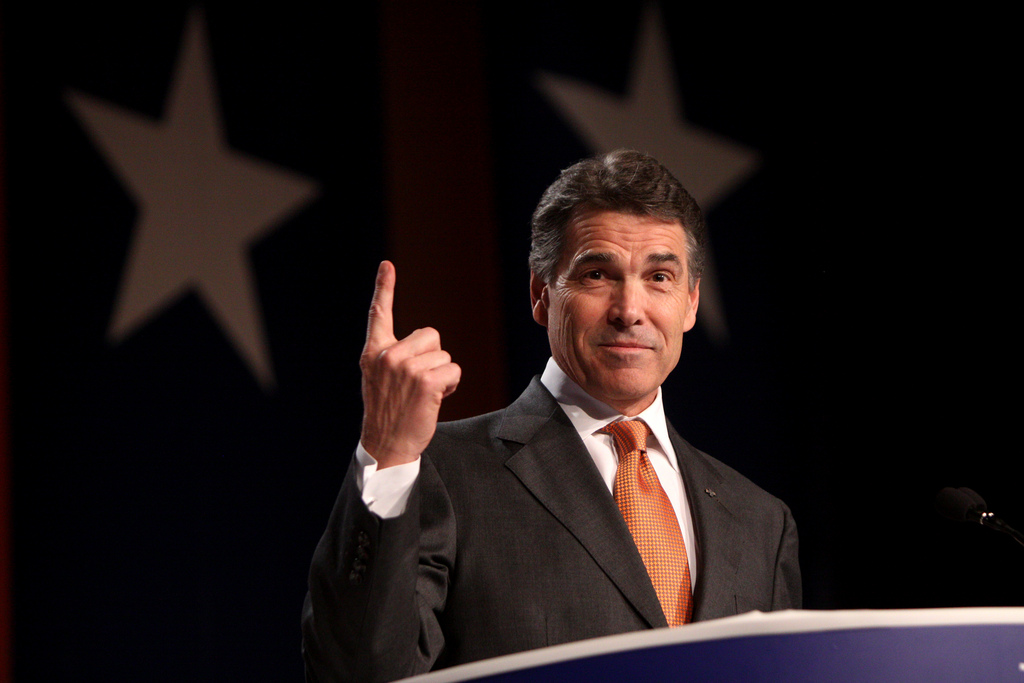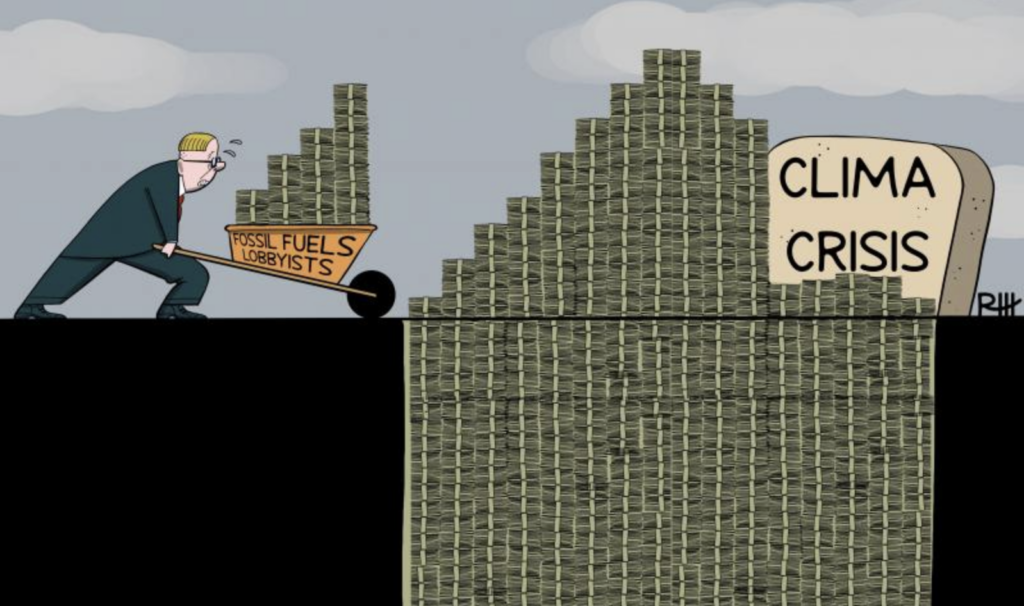Last week Rick Perry, the former Republican governor of Texas, became the Secretary of Energy. As head of the Department of Energy (DOE), he is now responsible for guarding the U.S. nuclear arsenal, cleaning up nuclear waste, directing federal energy research and development, and advancing domestic energy production, from nuclear and renewables to, yes, oil, gas, and coal.
On March 2, the day Perry was confirmed, right-wing think tank the Heritage Foundation published a document laying out its goals for Perry in his new post. Like the Heritage Foundation, Perry has received considerable funding from oil and gas interests, creating potential conflicts of interest as DOE chief and suggesting he might be inclined to take Heritage’s advice.
The Heritage Foundation already has had a significant influence on the Donald Trump administration, with numerous employees earning roles on his presidential transition team.
One Heritage fellow was on Trump’s Environmental Protection Agency (EPA) transition team, which created the plan to dismantle a number of environmental protections and make steep budget cuts to the agency.
Trump went on to use a Heritage Foundation blueprint for his proposed budget, which, in addition to its big EPA cuts, would eliminate DOE’s Office of Energy Efficiency and Renewable Energy and Office of Fossil Energy, which works to reduce the environmental impact of fossil fuel development. The president wants to cut the Energy Department budget by one-quarter, in order to increase defense spending, and to privatize Energy Star, a program that labels qualifying products as energy efficient, and related programs.
The Heritage Plan: Fossil Fuels Only
The Heritage plan for Perry’s Energy Department predictably urges him to remove the agency from its intervention in energy markets and to cease funding renewable energy initiatives. The paper calls on Perry to “review pending energy-efficiency regulations and refrain from issuing new ones.”
Heritage wants the department to stop using the “social cost” of carbon, methane, and nitrous oxide when it calculates cost-benefit analyses. The document even states that some adjusted estimates have indicated that doubling of carbon dioxide in the atmosphere is “a net benefit to society” (emphasis theirs), something the greater scientific community would instantly reject.
More advice from the Heritage Foundation includes hastening the exportation of natural gas; limiting the department’s spending on research and development; opening up its laboratories to far more “engagement” with the private sector; and phasing out the department’s loans, which often go towards clean energy and energy efficiency projects.
When the Heritage authors write that their recommendations will “be met with accusations of being ‘anti-science,’ ‘anti-clean energy,’ and even ‘extreme,’” they’re exactly right.
The proposal reads like an advertisement for the deregulation of fossil fuels and the cessation of clean energy research and support.
The Heritage Foundation has taken in large donations from the likes of the billionaire Koch brothers — whose business empire encompasses natural gas extraction and transportation — as well as ExxonMobil and two foundations of the late Richard Mellon Scaife, heir to the Mellon banking and oil fortune.
Perry appears to disagree with some of these proposed cuts to his agency, particularly when it comes to moving away from technology development and commercialization, and as governor of Texas, he supported the expansion of wind energy capacity.
However, natural gas production exploded in Texas while Perry was governor, and he’s a big proponent of hydraulic fracturing and deepwater oil drilling, earning him endorsements for energy secretary from the American Petroleum Institute and the Texas Oil and Gas Association. He also backed a significant coal expansion in Texas.
In 2012, Perry wanted to eliminate the very agency of which he’s now in charge, a position he has reversed. Perry has repeatedly denied the science of climate change, once calling it “a contrived phony mess,” but in a recent Senate confirmation hearing, under oath, he did acknowledge that man-made climate change exists. Also in that hearing, Perry said he supports funding research and working on renewables and energy efficiency.
Perry’s Potential Conflict of Interest: Oil and Gas Campaign Cash
Having taken over the Energy Department, Perry has a massive potential conflict of interest: As MapLight recently reported, six of Rick Perry’s past political campaigns received nearly $12 million from the oil and gas industry and roughly $1.5 million from electric utilities.
It’s no wonder oil and gas corporations have poured cash into Perry’s campaigns: His home state of Texas houses roughly one-third of the estimated U.S. oil reserves and hosts the headquarters of major oil companies including ExxonMobil, Valero Energy, and ConocoPhillips.
Fossil fuel executives gave the biggest cumulative sums.
Forrest Hoglund, the former CEO of both Enron and Texas Oil and Gas Corp. who now leads a natural gas transportation business, gave Perry the most, at $330,000. Perry ally and Texas oilman Jefferson Davis Sandefer gave nearly $300,000, and billionaire oilfield owner and oil and gas investor Lee Bass, along with his wife Ramona Seeligson, donated close to $290,000. Wealthy, well-known GOP megadonors who also happen to be oil and gas executives, such as Ray Hunt, T. Boone Pickens, and Trevor Rees-Jones, also contributed hundreds of thousands of dollars to Perry campaigns.
Company and trade association Political Action Committees (PACs) gave their share of donations, too, with the business that became Energy Future Holdings leading the pack at nearly $200,000 in donations to Perry’s campaigns. Valero Energy contributed $150,000, and the Texas Oil and Gas Association gave $140,000. BNSF railway, which transports crude oil, forked over $130,000, and electric utility American Electric Power gave over $90,000. ExxonMobil has contributed $40,000, while ConocoPhillips gave nearly $38,000.
Owing so much of his political career to his oil and gas benefactors, it’s hard to conclude that Perry will do much, if anything, to rein in the industry or promote clean energy and energy efficiency instead.
As Energy Secretary, Perry may apply an “all-of-the-above” approach to energy, but based on the Heritage Foundation’s plans, odds are that will look mostly like fossil fuel energy.
Main image: Governor Rick Perry speaking at the Values Voter Summit in Washington, D.C. in 2011. Credit: Gage Skidmore, CC BY–SA 2.0
Subscribe to our newsletter
Stay up to date with DeSmog news and alerts







